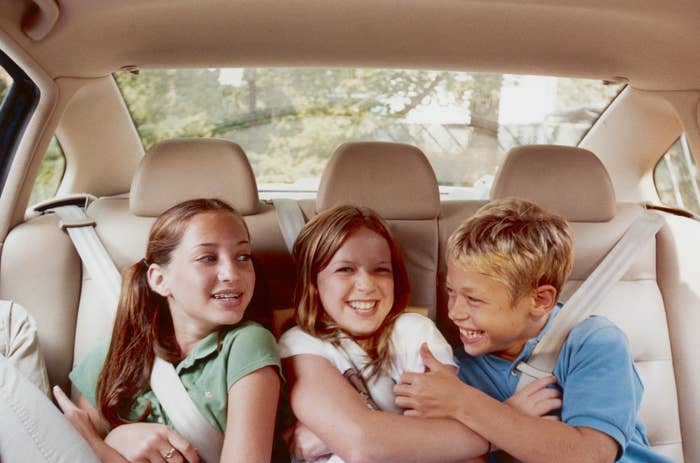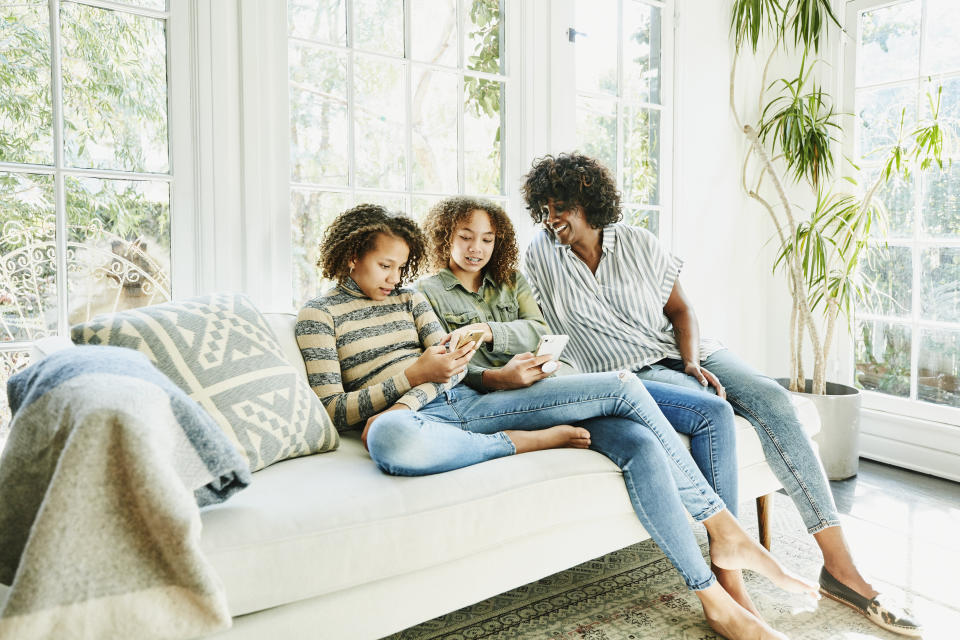The Surprising Way Having Siblings Can Affect A Teen's Mental Health
A recent study published in the Journal of Family Issues suggests having multiple siblings may come with a potential downside for young teens. Research based on data collected from eighth graders found that kids with a large number of siblings appear to have worse mental health traits than their peers in smaller families.

“Parents who have more children may have fewer resources to reduce stress in the home relative to parents who have fewer children,” according to the study’s authors.
What’s more, researchers found that having older siblings close in age or any siblings within one year of each other had the strongest association with poor mental health.
“Closely spaced siblings compete more for the kinds of resources the target child needs from parents,” the authors wrote. “In addition, siblings born within one year and older are the only ones associated with lower mental health while younger siblings have no association with mental health.”
The researchers gathered data from almost 19,000 children in the United States and China with an average age of 14. They found that kids who had no siblings in China appeared to have the best mental health across the country, while single children and those with one sibling in the United States had better mental health than subjects with multiple siblings.
How does the number of siblings affect mental health?
To put it simply, parents with more than one kid obviously have to split their attention.
“This assertion of slightly poor mental health is most likely based on resource dilution,” explained Jeff Gardere, a clinical psychologist and professor at Touro College of Osteopathic Medicine. “In other words, the more children there are in the family, the less attention parents are able to pay to each, and the less financial resources they can spend on the children.”
Samantha Quigneaux, a licensed therapist and the national director of family therapy services at Newport Healthcare, said a lack of parental attention can trigger drawbacks like low self-esteem, insecurity and the inability to form healthy relationships.
“More children could mean more competition for parents’ time and attention, and children who experience inconsistent or insufficient attention may develop feelings of neglect which can lead to mental health issues,” she said.
But, Quigneaux pointed out, the amount of attention needed by any child to properly thrive in the world may vary. It’s not totally quantifiable nor is it applicable from kid to kid.
How does a close age gap among siblings affect their mental health?

According to the new study, the age difference between siblings also has a bearing on their mental health, with close gaps overall leading to poorer outcomes. According to Gardere, that trend is directly related to “bungling.”
“Because they are closer in age, the kids may have the same maturational stage as we tend to treat them the same way or give them the same type of resource,” he said. “The reality is that they may be close in age but have individual needs and, as parents, we tend to miss that. In other words, we don’t distinguish their individual or unique needs or perspectives.”
Quigneaux believes that the tendency to compare each other should also be part of the larger conversation, as kids, especially teens, “are experiencing an increased awareness of others which leads to competition and comparison.”
Siblings that are close in age in particular probably share friends and partake in similar activities, both facts that may indirectly force them to compare their lives. That, Quixneaux said, “can lead to anxiety and self-esteem issues.”
Are there any positive mental health benefits to having siblings?
The short answer is yes. This is just one finding; research also shows that siblings can be beneficial in different points of our lives as well.
“Having siblings can contribute positively to the mental health of teens by providing emotional support, fostering a sense of companionship and creating a built-in social network,” Quigneaux said. “Siblings can offer a unique understanding of each other’s experiences, share a sense of belonging, and provide companionship during both positive and challenging times.”
Gardere noted that the “diluted” love and support offered by parents is in direct juxtaposition to the attention given by siblings.
“It’s like being born to a band or an athletic team,” Gardere said. “There is more support from not only the parents but especially the siblings.”
Only children may get more attention from their parents than those with siblings, but the latter group gets to interact with brothers and sisters, which, in a way, fills up the void of their parents’ “diluted” attention.
What can parents do to mitigate this?

Although the results of the study make sense, it’s important to note that parents can try and decrease the negative impact of having to spread their attention across multiple kids. This mostly involves understanding each child’s individual needs and setting time aside for one-on-one moments.
“To mitigate potential mental health effects of having many siblings, individuals can focus on developing strong communication skills within the family, fostering individualized connections with each sibling, and seeking support from parents or other trusted adults,” Quigneaux explained. “Establishing personal boundaries, and ensuring that each sibling feels heard and understood can contribute to a healthier family dynamic.”
That being said, Gardere noted that it’s important to actually listen to our kids and ask them about their own state of being.
“Discern their individual needs and provide them with tailored attention,” he said. “But most importantly take the time to listen to each child individually, sometimes by themselves, and they will tell you what they want and what they need from you as their parents.”
Gardere also brought up the schooling system in relation to family dynamics, suggesting to consult counselors, therapists and even pediatricians about matters, and not being afraid to ask for advice.
This article originally appeared on HuffPost.


